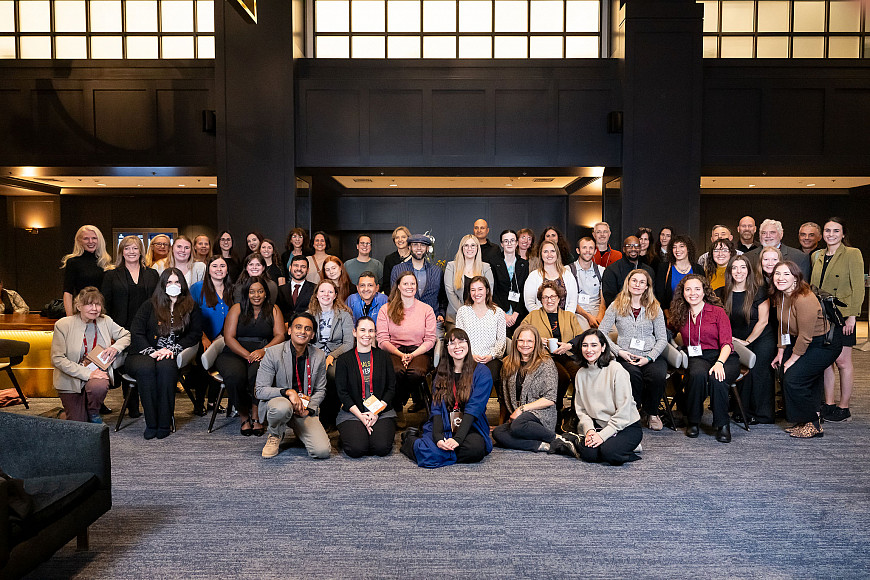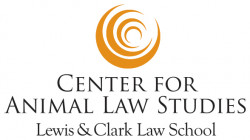Insights from the 32nd Annual Animal Law Conference
A sold-out crowd enjoyed a weekend devoted to animal law and advocacy

October 18th to 20th marked the 32nd annual Animal Law Conference (ALC), held in Portland, Oregon and online. With a sold-out in-person crowd, and more than 150 online attendees, the ALC offered a remarkable platform for animal attorneys, academics, students, and advocates from around the world to share insights and stay updated on the latest developments in animal law. The ALC is co-presented annually by the Center for Animal Law Studies (CALS) at Lewis & Clark Law School and the Animal Legal Defense Fund (ALDF)
Friday night featured opening remarks from Chris Green, ALDF’s Executive Director, and Megan Senatori, CALS’ Associate Director. Attendees enjoyed a night of networking with old and new friends over plant-based appetizers and drinks.
Saturday’s first panel, Navigating Politics to Protect Animals, was moderated by Chris Green and featured panelists Rachel Atcheson, a New York City government staffer, and Manny Rutinel, a Colorado House Representative. Both panelists shared unique insights about how animal advocates can engage with politics and public policy, offering perspectives from various levels of government. They inspired attendees to consider the importance of animal advocates working outside animal-protection organizations, including in government.
Jamie McLaughlin,* Staff Attorney for the Nonhuman Rights Project, moderated and spoke on the next panel, Protecting Farmed Animals & Preserving Land Resources. She was joined by Cheryl Leahy, Executive Director of Animal Outlook, and Cynthia von Schlichten,* General Counsel at Farm Sanctuary and CALS Adjunct Professor. The panel offered insightful analysis of issues ranging from legal strategies for challenging cruelty to farmed animals to the mismanagement of public lands, including government-sanctioned wildlife killings on public lands. The panel’s innovative approaches illustrated the critical intersection of environmental and animal law, sparking new ideas for attendees passionate about these issues.
After lunch, Dr. Paul Locke, Professor at Johns Hopkins Bloomberg School of Public Health and CALS Adjunct Professor, kicked off the discussion on Laboratory Animal Legislation, Litigation, and Care Standards. The panel featured Rebecca Critser,* Post-doctoral Fellow at Johns Hopkins and CALS Adjunct Professor; Justin Goodman, Senior Vice President of Advocacy and Public Policy at White Coat Waste; and Katherine Meyer, Inaugural Director of the Brooks McCormick Jr. Animal Law and Policy Clinic at Harvard Law School. The panelists discussed recent innovations and strategies, including state and federal legislative proposals to improve the likelihood of rehoming former research animals; the importance of working across the aisle and challenging government funding of animal research; non-animal research models; and methods that aim to replace, reduce, and refine the use of animal models in research and testing. Attendees left better equipped to tackle these vital issues in their future work.
The afternoon continued with the panel Juveniles Committing Animal Cruelty, which featured experts Meena Alagappan, Executive Director of Humane Education Advocates Reaching Teachers, and Dr. Lacey Levitt, Licensed Clinical Psychologist, and was moderated by Kathleen Wood, Senior Staff Attorney at ALDF. This session examined the troubling prevalence of animal maltreatment among youth and the implications for animals and communities. The dialogue revealed that animal maltreatment is often a red flag for a minor’s exposure to abuse and risk of future offenses against humans. Alagappan and Dr. Levitt discussed the risk factors giving rise to this behavior and different types of animal maltreatment. These insights sparked conversation about the critical need for a holistic approach to advocacy. Rather than solely focusing on punitive measures, the panel suggested that effective interventions should include educational programs and community engagement initiatives aimed at fostering empathy and compassion towards animals.
The day’s panels concluded with a discussion over Recent Victories in International Animal Protection. Joyce Tischler, CALS Professor of Practice and renowned “Mother of Animal Law,” moderated the panel of experts: Giulia Malerbi,* Head of Global Policy at the Aquatic Life Institute; Borami Seo, Director of Government Affairs at the Humane Society International/Korea; and Ben Williamson, Executive Director of Animal Outlook. Panelists emphasized recent successes, including bans on live animal export (UK), octopus farming (Washington and California), and dog-meat trade (South Korea). Their conversation underscored the power of public advocacy and legislative action in driving meaningful global change and provided attendees a sense of global solidarity. Successful international campaigns also encouraged local advocates to think beyond their borders and consider how global movements can create local change.
Saturday’s panels and robust discussion culminated in a banquet dinner, highlighted by an awards ceremony and keynote speaker Ethan Brown, Founder and CEO of Beyond Meat. CALS and ALDF presented a Lifetime Achievement Award to Katherine Meyer and Eric Glitzenstein, accomplished attorneys who have litigated for animal protection for more than 40 years. Introduced by Professor Tischler, Brown took the stage and shared his inspiring journey in revolutionizing the meat aisle with plant-based meat, as well as how individual compassionate dietary choices support the legal work done by ALC attendees and throughout the movement.
Sunday, the ALC’s third and final day, began with a fascinating dive into the sophisticated language of animals. The panel, Translating the Language of Whales & Other Species: Legal, Ethical, and Policy Implications, was moderated by Hira Jaleel,* CALS Visiting Assistant Professor, and featured César Rodriguez-Garavito, Director of the More Than Human Rights Project at NYU School of Law, and David Gruber, Founder and President of Project CETI (Cetacean Translation Initiative).The panelists spoke on the advancements in biological sciences chipping away at human-dominated species hierarchy, from recognizing animal sentience and cognition to problem-solving and complex language. The discussion focused on key evidence demonstrating complex and sophisticated language-like features in whales and other species, as well as strategies to advance case law and develop legal and ethical guidelines to protect these species we still do not fully understand. This panel expanded attendees’ understanding of animal sentience and cognition, encouraging critical thinking about these findings’ legal and ethical implications.
For the next session, attendees chose to attend one of two sessions. The first panel, Legal Strategies for Protecting Wildlife, was moderated by Dr. Rajesh Reddy, Assistant Professor of Law at Lewis & Clark Law School and Animal Law Program Director, and featured Katie Kraska, former Director of Federal Legislation at ASPCA, and Eric Glitzenstein, Director of Litigation at the Center for Biological Diversity. The panel showcased effective litigation, legislative, and regulatory strategies for safeguarding wildlife and explored a wide range of approaches aimed at ensuring the survival and well-being of diverse animal populations.
The second panel, Striking Out on Your Own – The Challenges and Benefits of Solo Animal Law Practice, was moderated by Vanessa Shakib, Co-Founder and Co-Director of Advancing Law for Animals. Solo Practitioners Jennifer Friedman, Canada’s Animal Lawyer; Will Lowrey, Founder and Legal Counsel of Animal Partisan; and Matthew Strugar, Attorney at Law Office of Matthew Strugar, highlighted the diverse avenues available for attorneys to make meaningful impacts for animals in a small-practice setting. The panelists shared personal insights from their experiences and careers pursuing animal law in nonprofit and for-profit solo practice.
The ALC drew to a close with two more concurrent panels. In Animal Protection in the United States Territories, Emma Clifford, Executive Director of Animal Balance; Vivian González Méndez,* Litigator and Professor at the University of Puerto Rico School of Law; and Anlis Mercado Rios, paralegal at Ayuda Legal Puerto Rico and former spokesperson for the National Organization for Animal Rights in Puerto Rico, participated in a roundtable discussion. Jessica Chapman,* ALDF Staff Attorney, led the discussion and focused on grassroots advocacy from a nonprofit perspective. Each panelist spoke about how to collaborate with communities from some of the U.S. territories, including addressing territories’ specific needs, vulnerable human communities, and unique regional dynamics regarding animal protection.
In the other concurrent panel, Anticipating Animal Law’s Intersectional Future, Pamela Frasch, Professor of Law and Brooks McCormick Jr. Scholar of Animal Law and Policy at Lewis & Clark Law School, spoke with Ever Vimbai Chinoda,* Founder and Executive Director of Speak Out for Animals; Jayasimha Nuggehalli, Co-Founder and Chief Program Officer of Global Food Partners; and Paul Waldau, President of the Religion and Animals Institute. The discussion shed light on the religious and cultural aspects of animal law, offering thought-provoking reflections on the diverse belief systems and traditions that inform our relationships with non-human animals and how animal advocates can engage with faith leaders.
The 32nd annual ALC was an enriching educational experience and a reaffirmation of the community’s collective commitment to animal advocacy. Attendees departed inspired by the passion and dedication of their fellow participants and speakers. The ALC underscored the critical role each advocate plays in advancing animal welfare and rights, as well as promoting a more compassionate society.
CALS extends its heartfelt gratitude to everyone who attended, both in-person and online, for your commitment to improving the lives of animals. A special thank you to the speakers and moderators—whose vital work across various disciplines inspires others to join the movement for animal advocacy—as well as this year’s sponsors: Carol House Furniture, Stray Dog Institute, Beyond Meat, MissionWired, and Cat Koshkin & Patrick Cleary, whose generous support helped to make this year’s ALC possible. And, finally, thank you to Lewis & Clark Law School 3L, Isaac Christman, who helped to prepare this blog.
*Denotes that the individual is a Lewis & Clark Law School animal law student or alumni
The Center for Animal Law Studies (CALS) was founded in 2008 with a mission to educate the next generation of animal law advocates and advance animal protection through the law. With vision and bold risk-taking, CALS has since developed into a world-renowned animal law epicenter. CALS’ Alumni-in-Action from 30 countries are making a difference for animals around the world. Animal law advanced degrees are offered in-person and online. CALS is a self-funded Center within the law school operating under the Lewis & Clark College 501(c)(3) tax-exempt status, and is able to provide these educational opportunities through donations and grants.
More Center for Animal Law Studies Stories
Center for Animal Law Studies is located in Wood Hall on the Law Campus.
MSC: 51
email cals@lclark.edu
voice 503-768-6960
Center for Animal Law Studies
Lewis & Clark Law School
10101 S. Terwilliger Boulevard MSC 51
Portland OR 97219


